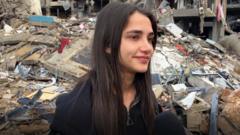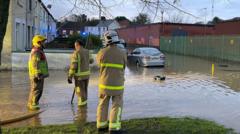In the aftermath of recent conflicts between Israel and Hezbollah in southern Lebanon, many residents are facing devastating losses, with numerous homes destroyed and families displaced. The story of Rayane Salman, a 25-year-old resident, exemplifies the profound personal impact of the ongoing tensions.
Salman’s experience reflects the broader humanitarian crisis unfolding in the region. Her family home, which represented generations of memories and hard work, was completely destroyed in an Israeli air strike. The sudden and total loss of their dwelling highlights the brutal reality of the conflict, where years of personal history can be erased in a single moment.
“My parents spent all their lives in this house, and we did as well,” Salman told BBC correspondent Lina Sinjab, her words capturing the emotional devastation of losing not just a physical structure, but a repository of family memories and personal identity.
The current situation in southern Lebanon is characterized by widespread destruction and uncertainty. With a ceasefire now in place, many residents are confronting the challenging reality of rebuilding their lives from scratch. The conflict has left numerous families without homes, forcing them to contemplate an uncertain future.
The destruction goes beyond mere physical infrastructure. For many like Salman, the loss represents a deeper psychological and emotional trauma. Families have been uprooted from communities they have inhabited for generations, facing the daunting task of reconstruction and healing.
The international community has been increasingly concerned about the humanitarian implications of the ongoing tensions between Israel and Hezbollah. The frequent exchanges of fire have resulted in significant civilian casualties and widespread property damage, particularly in southern Lebanon’s border regions.
While the ceasefire offers a temporary respite, the long-term challenges remain substantial. Rebuilding homes, restoring infrastructure, and healing community wounds will require significant resources and sustained international support.
Salman’s story is not unique but represents a broader narrative of loss and resilience. Thousands of families in the region are grappling with similar experiences, trying to maintain hope in the face of extensive destruction.
The conflict underscores the human cost of prolonged regional tensions, where civilians bear the brunt of geopolitical conflicts. Each destroyed home represents not just a physical loss, but a disrupted life, shattered dreams, and a community’s collective trauma.
As southern Lebanon begins the slow process of recovery, stories like Salman’s serve as powerful reminders of the personal dimensions of conflict, urging international attention and compassionate intervention.
The path forward will require not just physical reconstruction, but also emotional healing and a commitment to peaceful coexistence in a region long marked by tension and uncertainty.




